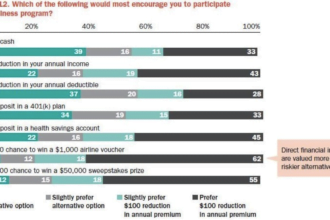 The Chief Information Officer in a healthcare system has perhaps one of the most complex and ever-evolving roles in the hospital C-Suite today. Since information technology has now permeated our entire culture – and particularly in medicine – executive level information management is hot field nowadays.
The Chief Information Officer in a healthcare system has perhaps one of the most complex and ever-evolving roles in the hospital C-Suite today. Since information technology has now permeated our entire culture – and particularly in medicine – executive level information management is hot field nowadays.
 The Chief Information Officer in a healthcare system has perhaps one of the most complex and ever-evolving roles in the hospital C-Suite today. Since information technology has now permeated our entire culture – and particularly in medicine – executive level information management is hot field nowadays.
The Chief Information Officer in a healthcare system has perhaps one of the most complex and ever-evolving roles in the hospital C-Suite today. Since information technology has now permeated our entire culture – and particularly in medicine – executive level information management is hot field nowadays.
Strategic planning within an organization tends to encompass many areas – but for the Chief Information Officer, most of their planning requirements fall under the category of information management. For most modern hospitals, information management is largely to do with electronic health records and the business transactions that surround them. While CIOs are not down in the trenches laying the groundwork for databases or troubleshooting minor issues, they are overseeing the purchasing, implementation and staffing needs to make the whole operation run smoothly.
That being said, there are many strategic planning challenges that CIOs are facing these days.
1. Strategic Planning – Meaningful Use
Actually, when it comes to current challenges in healthcare, Meaningful Use isn’t limited to CIOs! However, a good portion of Meaningful Use requirements revolve around information technology, so in some hospitals who are looking to achieve the next stage of Meaningful Use, the CIOs may be bearing the brunt of the workload right now. Since a hospital’s success at moving through each stage of Meaningful Use is directly tied to Medicare reimbursement, there is a significant financial penalty if your hospital doesn’t meet the stage – and if the task at hand involves your EMR, the CIO is probably feeling the heat.
2. Strategic Planning – Health Information Exchange (HIE)
Sort of dovetailing with Meaningful Use requirements are those found in the HITECH Act. Within these requirements you’ll find the daunting task of developing pathways for sharing information with patients. It’s no longer just enough to make sure that care is coordination amongst doctors through EMRs, now CIOs are tasked with figure out how to provide a secure and easy to navigate patient portal that allows patients, too, to have 24/7 access to their medical records and a way to communicate with their physician electronically. Not only is this difficult from a medicolegal perspective, but there are also concerns about health literacy to undertake.
3. Strategic Planning – The Great Healthcare Reform
Since we know how well the roll-out for Obamacare went online, CIOs are probably feeling anxious about the requirement for health insurance exchanges. Patients now need to be able to purchase health insurance in this manner and, while it might have seemed like a pretty straight forward task to undertake, if you remember the SNAFU of the initial healthcare.gov rollout, than you can begin to see that there are mounting challenges for developing these exchanges – and it doesn’t always have to do with planning and development – technical malfunctions can happen even at the highest level of the government.
4. Strategic Planning – HIPAA
We all know the knock-knock joke.
Knock, knock.
Who’s there?
HIPAA!
HIPAA who?
Sorry, I can’t tell you.
HIPAA compliance is perhaps one of the most frustrating challenges for CIOs because when it comes to protecting a healthcare organization from breaches, all of this new patient presence across the web opens up so many opportunities for hackers to steal information – in particular, patient identifiers that are a buffet for identity theft. Patient information as it is kept in hospital electronic records and computer-to-computer communication is heavily encrypted – but even as the processes for encryption grow harder to crack, so too do the hackers become more advanced. Some hospitals are actually developing EMR hackathons in order to safely identify areas of weakness within their infrastructure that could be entrance points for potential thieves. This is a major focus not just for CIOs, but the entire C-Suite, as HIPAA compliance stretches beyond information technology. It isn’t enough to develop HIPAA compliant programs – a CIO also needs to be constantly reevaluating and looking for ways to improve – the only way to outsmart a breach is to stay one step-ahead of the hackers.
5. Strategic Planning – Telemedicine
For urban hospitals, telemedicine probably seems like the logical next step. In places where Google Fiber already exists, the prospect of having reliable internet connectivity not only within a hospital system, but within the entire national network of healthcare providers probably seems not too far off. But for rural hospitals, where the reliability of internet connection is inconsistent at best, CIOs at these facilities are growing increasingly concerned that they’ll fall behind. It’s not that these hospitals don’t want to incorporate the technology, quite the opposite. They would willingly embrace it but their location makes it either impossible or nearly impossible for telemedicine to be reliably implemented at their facility. CIOs in these situations need to be not only connected to the internet providers – and willing to demand services that are so desperately needed for the to remain competitive, but also creative. Telemedicine is, perhaps, the next frontier of medicine and with more than 2,000 registered rural hospitals (AHA) in the United States – and the CIOs at those facilities have a great task ahead of them in the coming years.








